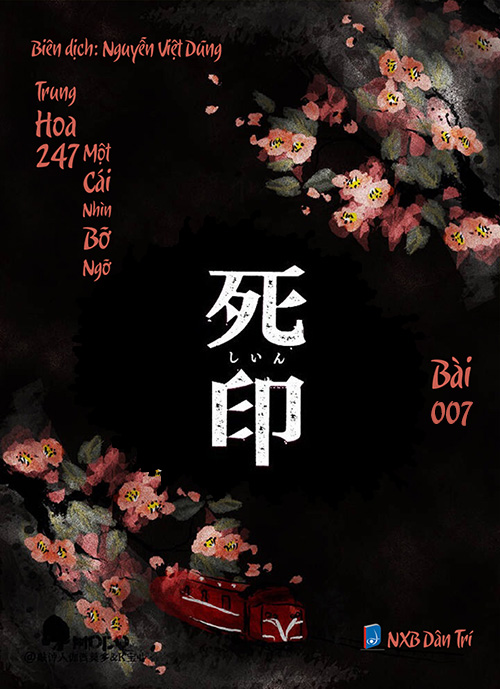Audio – Sách Trung Quốc 247: Góc nhìn bỡ ngỡ – Bài 007 – Cách dùng chữ Tử – “死”的用法 (“死”的用法) – “Sǐ” de yòngfǎ
Chú ý: Đây là tài tiệu đi kèm sách bản cứng Trung Quốc 247: Một cái nhìn bỡ ngỡ. Tài liệu sẽ có ích và có tác dụng tối đa khi dùng cùng sách bản cứng. Cả nhà có thể xem thêm về sách bản cứng nha!
Giản thể: “死”的用法
在中文里面,“死”除了表示死亡、去世的意思之外,还有一个重要的用法。这种用法在口语中使用,能很夸张地描述一件事情或者表达人的心情。
这种用法很简单,就是“动词/形容词+死了”。如果天气很热,人们抱怨“热死了”。公共汽车上人太多,人们抱怨“挤死了”。遇到不高兴的事情,人们就抱怨“气死了”。突然被惊吓,人们就抱怨“吓死了”。工作太多,工人抱怨“累死了”。没有事情做,人们抱怨“无聊死了”。如果肚子很饿,可以说“饿死了”;但是别吃太多,否则就要“撑死了”。另外,还有“担心死了”,“着急死了”等等。如果你的中文很好,你甚至可以说慢速中文“慢死了”。
更有意思的是,“死”也可以用来表达好心情。收到礼物,寿星觉得“开心死了”。考试取得好成绩,学生觉得“高兴死了”。见到明星,歌迷们觉得“激动死了”。另外,还有“兴奋死了”,“幸福死了”等等。记住,在这种好的情况下,一般不用这种用法来描述一件事情。
Phồn thể: “死”的用法
在中文裡面,“死”除了表示死亡、去世的意思之外,還有一個重要的用法。這種用法在口語中使用,能很誇張地描述一件事情或者表達人的心情。
這種用法很簡單,就是“動詞/形容詞+死了”。如果天氣很熱,人們抱怨“熱死了”。公共汽車上人太多,人們抱怨“擠死了”。遇到不高興的事情,人們就抱怨“氣死了”。突然被驚嚇,人們就抱怨“嚇死了”。工作太多,工人抱怨“累死了”。沒有事情做,人們抱怨“無聊死了”。如果肚子很餓,可以說“餓死了”;但是別吃太多,否則就要“撐死了”。另外,還有“擔心死了”,“著急死了”等等。如果你的中文很好,你甚至可以說慢速中文“慢死了”。
更有意思的是,“死”也可以用來表達好心情。收到禮物,壽星覺得“開心死了”。考試取得好成績,學生覺得“高興死了”。見到明星,歌迷們覺得“激動死了”。另外,還有“興奮死了”,“幸福死了”等等。記住,在這種好的情況下,一般不用這種用法來描述一件事情。
Pinyin: “Sǐ” de yòngfǎ
Zài zhōngwén lǐmiàn,“sǐ” chúle biǎoshì sǐwáng, qùshì de yìsi zhī wài, hái yǒu yīgè zhòngyào de yòngfǎ. Zhè zhǒng yòngfǎ zài kǒuyǔ zhòng shǐyòng, néng hěn kuāzhāng de miáoshù yī jiàn shìqíng huòzhě biǎodá rén de xīnqíng.
Zhè zhǒng yòngfǎ hěn jiǎndān, jiùshì “dòngcí/xíngróngcí +sǐle”. Rúguǒ tiānqì hěn rè, rénmen bàoyuàn “rè sǐle”. Gōnggòng qìchē shàng rén tài duō, rénmen bàoyuàn “jǐ sǐle”. Yù dào bù gāoxìng de shìqíng, rénmen jiù bàoyuàn “qì sǐle”. Túrán bèi jīngxià, rénmen jiù bàoyuàn “xià sǐle”. Gōngzuò tài duō, gōngrén bàoyuàn “lèi sǐle”. Méiyǒu shìqíng zuò, rénmen bàoyuàn “wúliáo sǐle”. Rúguǒ dùzi hěn è, kěyǐ shuō “è sǐle”; dànshì bié chī tài duō, fǒuzé jiù yào “chēngsǐle”. Lìngwài, hái yǒu “dānxīn sǐle”,“zhāojí sǐle” děng děng. Rúguǒ nǐ de zhōngwén hěn hǎo, nǐ shènzhì kěyǐ shuō màn sù zhōngwén “màn sǐle”.
Gèng yǒuyìsi de shì,“sǐ” yě kěyǐ yòng lái biǎodá hǎo xīnqíng. Shōu dào lǐwù, shòuxing juédé “kāixīn sǐle”. Kǎoshì qǔdé hǎo chéngjī, xuéshēng juédé “gāoxìng sǐle”. Jiàn dào míngxīng, gēmímen juédé “jīdòng sǐle”. Lìngwài, hái yǒu “xīngfèn sǐle”,“xìngfú sǐle” děng děng. Jì zhù, zài zhè zhǒng hǎo de qíngkuàng xià, yībān bùyòng zhè zhǒng yòngfǎ lái miáoshù yī jiàn shìqíng.
Bản dịch tiếng Anh: The use of “死”
“As all hell!”: The use of “死”
The Chinese character “si”, apart from meaning to die or pass away, has another important usage. This usage is applied in everyday speech, and can exaggeratedly describe an event or express a feeling.
Usage is very simple; just add “si le” to either a verb or adjective. For example, if the weather is too warm, people will complain, “It’s hot as hell.”* If a public bus is crowded, people will complain, “It’s packed as hell.” If something untoward happens, people will complain, “I’m angry as hell.” If suddenly frightened, people will complain, “I’m scared as hell.” When there’s too much work, workers will complain, “I’m tired as hell.” When there’s nothing to do, people will complain, “I’m bored as hell.” If you’re hungry, you can say, “I’m hungry as hell.” But don’t overeat, otherwise you will be “Full as hell.” Meanwhile, there is also “worried as hell’, “concerned as hell,” etc. If your Chinese is very good, you can even say Slow Chinese is “slow as hell.”
More fun is using “si” to express a good feeling. When receiving a birthday present, you can say you feel “happy as hell.” When they get good exam grades, students feel “glad as hell.” When meeting their idol, fans will feel “stoked as hell.” Additionally, there is “excited as hell” and “lucky as hell,” etc. Bear in mind that this usage of “si” is not normally employed to describe positive events.
*Here I have used the catch all English phrase, “…as hell” when “…to death” would be more literal, though it wouldn’t work in all examples.
Neil Armstrong (nbarmstrong123@gmail.com)
Phần dịch tiếng Việt có trong sách bản cứng: Trung Quốc 247 – Góc nhìn bỡ ngỡ cả nhà nhé!









